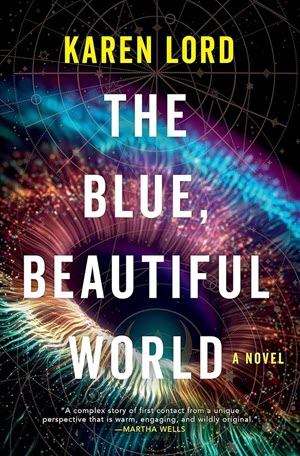The Blue, Beautiful World
 Imagine, for a moment, a small beautiful island yet to make contact with wider civilization. The inhabitants have a sophisticated culture, but are relatively technologically primitive. They are, of course, ripe for exploitation, and the fact that there is an embargo on contact is unlikely to deter anyone hoping to make a fast buck.
Imagine, for a moment, a small beautiful island yet to make contact with wider civilization. The inhabitants have a sophisticated culture, but are relatively technologically primitive. They are, of course, ripe for exploitation, and the fact that there is an embargo on contact is unlikely to deter anyone hoping to make a fast buck.
The island, of course, is Earth. The Galactic Council would love to make official contact, but the Earthlings are so very primitive in some ways. In particular they are highly averse to the idea of a planetary government, and the Galactic Council can’t be bothered dealing with a multitude of warring tribal factions. Also there is a very clear rule that, if a planet is to be admitted to galactic society, it has to provide representation for all intelligent species, not just the dominant one. So they wait, and nudge, and in the meantime others see opportunity.
This, then, is the set-up for The Blue, Beautiful World by Karen Lord. It is a sequel of sorts to The Best of All Possible Worlds and The Galaxy Game, but I read those books so long ago that I had forgotten who all of the characters were. That didn’t mar my enjoyment of the new book. I might wish that Lord produced new books a little quicker, but they are little gems when they arrive so I should not complain. I’m re-printing my review of earlier two books in this issue for those of you who want a little catch-up.
The book begins by following a pop star known only as Owen. He seems based a little on Ed Sheeran, but don’t let that put you off. The important point is that he’s busy building some sort of cultural empire, a way to influence society. He’s building a network of highly competent people, including his own security team led by a retired general. One of his key allies is Peter Hendrix, the genius CEO of ParaVee, a Dutch VR company. And one of their less-well-known products is a VR mask that allows the wearer to don a different face. That’s useful if your face is well-known all over the planet, or if your face doesn’t look entirely human.
Around a third of the way through we jump forward 11 years and change focus. Now our central characters are a bunch of gifted young people chosen for an elite diplomatic training programme. They are whisked off to a secluded base on Cuba where they are put through a bunch of exercises with a very strange premise. Earth has been infiltrated by rogue agents from an alien civilization. The galactic government will, at some point, have to intervene publicly. It will be a massive shock for Earth. How should our societies respond?
To us, as readers, the purpose of this exercise is obvious. To the young students is seems eccentric, until it becomes very real.
Like the previous two books in the series, this is a book about human society and how we manage it. Lord, having some experience of civil service work in her home nation of Barbados, has a very different view of global politics to someone who has grown up somewhere like the UK or USA. It is refreshing, and Lord is very smart. We may not be contacted by aliens in the near future, but we are facing a crisis of global proportions and the ideas put forward by people like Lord may be key to finding a way out of the mess we have got ourselves in.
Oh, and if the idea of commercial operations exploiting vulnerable foreign countries seems odd to you, read up a little on the activities of the East India Company. Or indeed check out what Meta is up to in various less wealthy parts of the globe.

Title: The Blue, Beautiful World
By: Karen Lord
Publisher: Gollancz
Purchase links:
Amazon UK
Amazon US
Bookshop.org UK
See here for information about buying books though Salon Futura